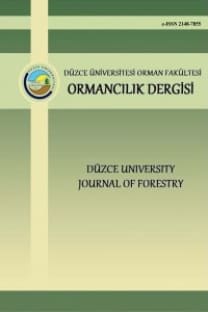Orman Ürünleri Endüstrisi Yöneticilerinin Ekonomi Okuryazarlık Seviyelerinin Belirlenmesi: Kahramanmaraş İli Örneği
Ekonomi Okuryazarlık, Ekonomi Bilinçlilik, Orman Ürünleri Endüstrisi
The Determination of Economic Literacy Level of Forest Products Industry Managers: A Sample of Kahramanmaras Province, Turkey
Economic Literacy, Economic Awareness, Forest Products Industry,
___
- Banks, J., O'Dea, C., and Oldfield, Z. 2007. Understanding Pensions: Cognitive Function, Numeracy and Retirement Saving. Fiscal Studies, 28: 143-170.
- Batu, F. 1999. Uygulamalı İstatistiksel Yöntemler, Trabzon
- Cole, S., Sampson, T., and Zia, B. 2009. Money or Knowledge? What drives the Demand for Financial Services in Developing Countries? Harvard Business School Working Paper, No. 09-117.
- Gerek, S. and Kurt, A. A. 2011. Ekonomi Okuryazarlığı Ölçeğinin Geçerlik ve Güvenilirlik Çalışması. Uludağ Journal of Economy and Society, Uludağ University, 1: 59-73.
- Guiso, L., and Jappelli, T. 2008. Financial Literacy and Portfolio Diversification. CSEF Working Paper 212.
- Noctor, M., Stoney, S. and Stradling, R. 1992. Financial Literacy, a report prepared for the National Westminster Bank, London.
- OECD (Organization for Economic Co-operation and Development) 2005. Improving financial literacy: Analysis of issues and policies. Paris: OECD Publications.
- Schagen, S. and Lines, A. 1996. Financial Literacy in Adult Life: a Report to the Nut West Group Charitable Trust (Slough, Berkshire: National Foundation for Educational Research).
- ISSN: 2148-7871
- Yayın Aralığı: Yılda 2 Sayı
- Başlangıç: 2005
- Yayıncı: Haldun Müderrisoğlu
Abant Tabiat Parkı Rekreasyonel Beklentilerinin Değerlendirilmesi
Şerif SAYIN, Aybike Ayfer KARADAĞ
Cengiz GÜLER, Barış ALTINTAŞ, A. Kemal YÜKSEK
Hasanlar Barajı (Düzce-Yığılca) ve Çevresinin Ballı Bitkileri
Neval GÜNEŞ ÖZKAN, Necmi AKSOY, Ahmet Salih DEĞERMENCİ
Samandere Vadisi ve Uğur Köyü – Şimşirlik (Düzce) Mevkii Florası
Düzce Üniversitesi Konuralp Yerleşkesinde Görsel Peyzaj Kalitesinin Değerlendirilmesi
Sertaç KAYA, Huriye BAŞAR, Tuğba CAN, Haldun MÜDERRİSOĞLU
Hasan SERİN, Yunus ŞAHİN, Muhammet DURGUN
Orman Ürünleri Sanayi Sektöründe İş Kazası İstatistiklerine Genel Bir Bakış
Kadri Cemil AKYÜZ, İlker AKYÜZ, Turan TUGAY, Tarık GEDİK
Mobilya İşletmelerinde Üst Yönetim ile Alt Bölümler Arasindaki İlişki Düzeyinin Belirlenmesi
